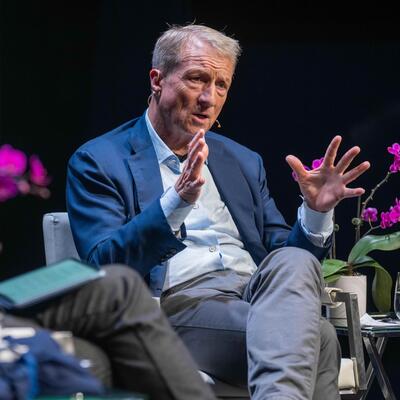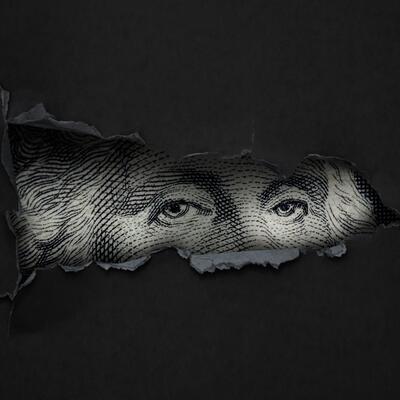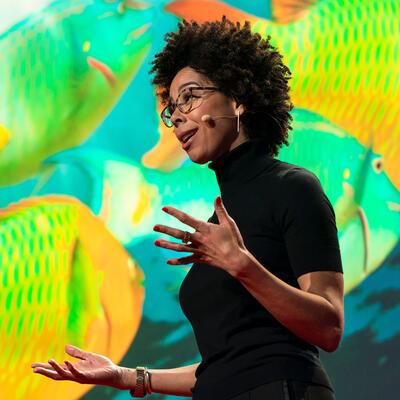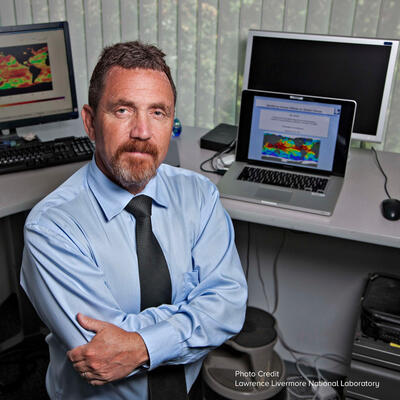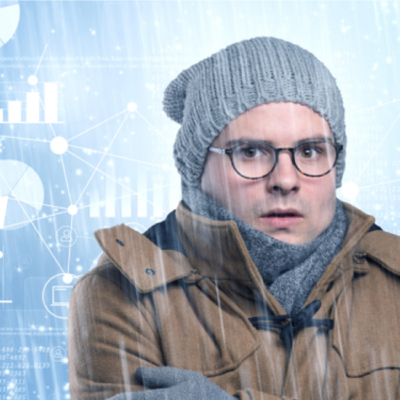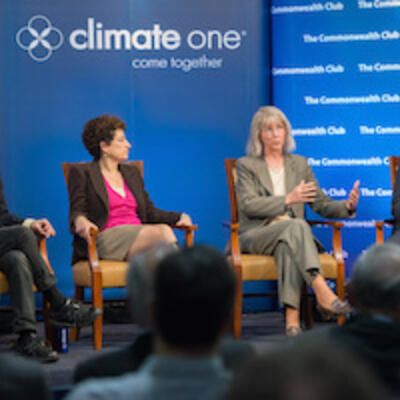
Climate Denial
Guests
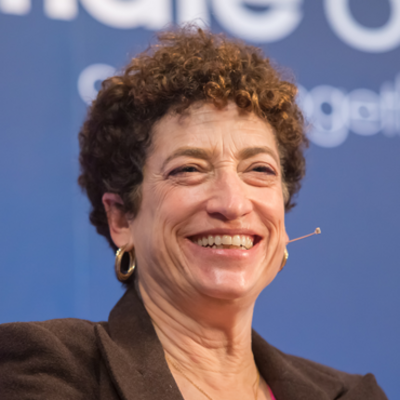
Naomi Oreskes
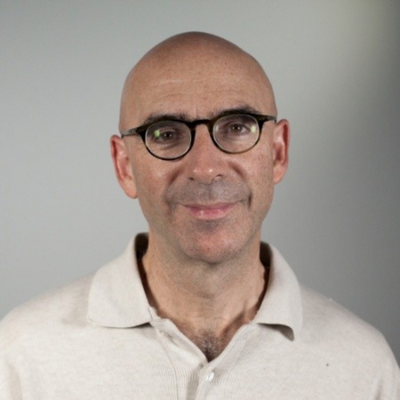
Joe Romm
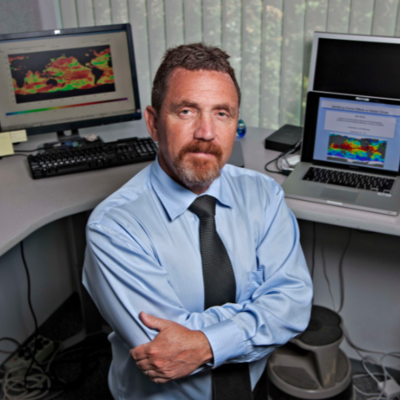
Ben Santer
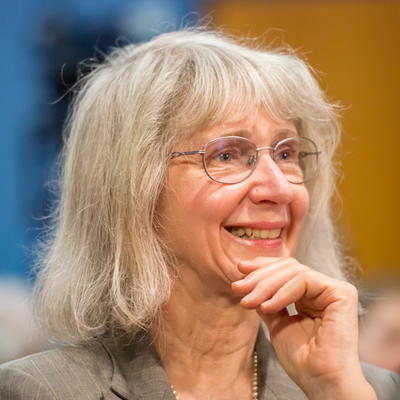
Eugenie Scott
Summary
Do you believe in climate denial? According to climate scientists, it’s all around us. How can scientists learn to communicate to a skeptical public?
Naomi Oreskes, Professor of the History of Science, Harvard; Co-Author, Merchants of Doubt: How a Handful of Scientists Obscured the Truth on Issues from Tobacco to Global Warming (Bloomsbury Press, 2011)
Joe Romm, Founding Editor, Climate Progress; Author, Language Intelligence: Lessons on Persuasion from Jesus, Shakespeare, Lincoln, and Lady Gaga (CreateSpace, 2012)
Eugenie Scott, Chair, National Center for Science Education
Full Transcript
Greg Dalton: Climate One is changing the conversation about America's energy, economy and environment. I'm Greg Dalton and today we're talking about the story of climate science and denial concerning the federal government about the effect fossil fuels are having on the Earth's atmosphere that goes back to the days of President Lyndon Johnson. Since then, the scientific consensus about the basic facts of climate disruption had become more solid. The opposition to those facts had become more fierce and effective. Even though accepting global warming involves an understanding of high school physics and chemistry, it has become a controversial and highly political issue.
Over the next hour, we will explore how that happened and discuss how American citizens comprehend and talk about the increasingly volatile climate that is evident today in all 50 states. Joining our live audience at the Commonwealth Club in San Francisco, we're pleased to have with us a science historian, a science educator, and a science communicator. Naomi Oreskes is professor of the History of Science at Harvard and co-author of Merchants of Doubt: How a Handful of Scientists Obscured the Truth on Issues from Tobacco to Global Warming. Merchants of Doubt is also an upcoming documentary. Joe Romm is founding editor of Climate Progress and author of Language Intelligence: Lessons on Persuasion from Jesus, Shakespeare, Lincoln, and Lady Gaga. And Eugenie Scott is chair of the National Center for Science Education. Please welcome them to Climate One.
[Applause]
Greg Dalton: Welcome all of you. Naomi Oreskes, let's begin with you. Your book traces the roots and the history of climate denials through the Cold War the tobacco area to today, and one of the central figures is a physicist named Fred Seitz. Tells us the story of Fred Seitz.
Naomi Oreskes: Well Fred Seitz was a remarkable feature. He was a very distinguished physicist that helped lay the foundations of solid-state physics. After World War II, had worked on the Manhattan Project, the hydrogen bomb, and became president of the U.S. National Academy of Sciences in the 1960s. So he was a scientist who worked at the very highest levels of American science and also played a very important role in serving on many high-level advisory committees to Congress and the president. But towards the latter part of his career, he went to work for the tobacco industry and he ran a program for R.J. Reynolds Tobacco funding what I've come to call "distracting research." Funding scientific research that wasn't fraudulent but was designed to distract attention away from the causes of tobacco, the dangers of tobacco smoke.
So, for example, they would fund research on other causes of lung cancer, the link between asbestos and lung cancer, the link between radon and lung cancer, other causes of heart disease, the role of stress in heart disease and high blood pressure. So it was legitimate research but its purpose was to cast doubt on the links between the harms of tobacco and scientific evidence. He did that work 1979 to 1985. And then the place where the story gets really thick and complicated is that in 1984, he founded the think tank with the group of other physicists, like himself, were also prominent physicists who have risen to positions of power and influence because of work they did in the Cold War.
But when the Cold War ends, they turn their attention to climate science. And not just climate science, but to a whole set of environmental issues that are quite familiar to all of us. Acid rain, the ozone hole, the role of pesticides in harming the environment, and they begin to challenge the scientific evidence on all of these issues. And the strategy they use is the strategy that Fred Seitz had developed working with R.J. Reynolds to cast doubt on the science to claim there's no consensus that we don't really know. And since we don't really know, it would be premature to do anything about it. And they pursued that strategy successfully for more than 20 years.
Greg Dalton: And so when there's doubt, there's paralysis and the incumbents win. Is that essentially it?
Naomi Oreskes: Exactly. The point is in action. If there's doubt, most of us, if we feel we're not sure about something, we would think, "Well we won't act until we know. So if the science is unsettled, then it seems logical that scientists should do more research. Let's wait and see." That was the phrase that they love to use. "Let's wait and see." And I always like to say, "Well you know what? We have waited and we have seen."
Greg Dalton: Joe Romm, how does that fit -- I want to take your take on that the narrative of the last couple of decades in terms of climate science emerging. It seems that the doubt, the questioning has kind of had the upper hand and certainly, if not, won the day, certainly had been very persuasive.
Joe Romm: Well as I think you know, I spent a long time studying communications, the world's greatest communicators and understanding what works and what doesn't. And as I said to you, if you're not telling stories, you're not communicating. I think that, frankly, everything I learned about communications, getting PhD in physics from MIT which I summarize as, "Use big words, don't repeat yourself, and be as literal and fact-based as possible," is not only not good advice, it's actually the exact opposite of literally 25 centuries of understanding of effective and persuasive communications that was developed by the Greeks and improved upon by the Romans, and then raised to the high art in English language by the Elizabethans who created the two great works of rhetoric, the works of Shakespeare and the King James Bible. And there's a reason why those two books fill up a quarter of all Bartlett's quotations because they wrote in the figures of speech and the figures of speech are what make things memorable.
And the figures of speech were just derived -- they're just memory tricks. They were developed by the great bards who had remembered these two hour-long epic poems so they had all these tricks: rhyme, alliteration, irony, metaphor, simile, there are 200 of them. I mean 200 different figures of speech. And the Greeks codified them because the Greeks switched from trial by a magistrate to trial by a jury. And the juries there were 500 people and it was majority vote wins. There are no rules of evidence. The accuser spoke for 30 minutes, you spoke for 30 minutes and whoever won the majority, won.
And I think the magic secret, which isn't taught, is that the key to being persuasive is to be memorable. And modern social science basically shows the stuff that's easier for you to remember, you're more likely to believe is true. And so, if that one fact were taught and our communications theory were based around it, all communications at every level would be completely different because numbers aren't, what is memorable are stories.
And it occurred to me in writing the book and then in talking about it, that the reason scientists -- scientists are anti-story and it's very easy to understand why because the Enlightenment was about replacing a story-based explanation of the world. Why do rainbows occur? Is it because God was sending a message that He was not going to have a big flood again? Or is it light bouncing around in raindrops? So --
Naomi Oreskes: You mean it's not God sending a message? [Laughs]
Greg Dalton: Yeah.
Joe Romm: It's a little bit of both.
[Laughs]
Joe Romm: But everybody knows and remembers the story. And so the point is that scientists are wary of stories. They often sound too good to be true and the whole point is it isn't -- the logo of the British Royal Society is ‘Nullius in verba.’ Words mean nothing. That's the point. Words mean nothing. But of course, in the real world, words mean everything.
Greg Dalton: Joe Romm is the founder of the Climate Progress blog. You're listening to Climate One. Let's go to a couple of stories. We have two scientists here with us who are going to share their stories and maybe there’ll be some facts in those stories, but these are very personal stories of scientists who have suffered some personal attacks and sharing their knowledge and pursuing truth. I would like to call first on Ben Santer, a climate researcher with the Lawrence Livermore National Laboratory. Ben Santer.
Ben Santer: What does it feel like to be a U.S. climate scientist in the 21st century? Well it feels a little scary at times. I'm on Senator James Inhofe's infamous list of 17 - one of 17 scientists Senator Inhofe has threatened with referral to the Justice Department from criminal prosecution. Mike is also on that list.
[Applause]
Ben Santer: That's concerning. I'm the target of Freedom of Information Act request for my emails and "research data." That's concerning and frustrating. I receive threatening emails from total strangers who don't like the work I do or the findings my colleagues and I have published - that too is concerning. Sometimes the threats are more serious and have affected my family sense of security and well-being - that's beyond concerning. It makes me feel angry and uneasy and always watchful. All of this bad stuff is the background noise of my life. I've learned to live with this noise. The bad stuff, as I see it, is the price of doing business, the price of publishing climate fingerprint research or doing climate science. But then there's the good stuff. Coming into work every morning and learning something new about the strange and wonderful world in which we live, what an extraordinary privilege being part of a community connected by a deep passion for advancing our understanding of complex scientific issues. How cool is that? And once in a while in your career, having the sense that you and you alone hold a tiny piece of the enormous climate change puzzle that nobody else in the world has - and that feeling is priceless.
[Applause]
Greg Dalton: Now I'd like to invite Michael Mann, professor of Meteorology at Penn State University and author of The Hockey Stick and the Climate Wars: Dispatches from the Front Lines. Welcome Michael Mann.
Michael Mann: Thank you. Well I'm going to tell a story - it's a true story. I've awakened to learn that my private emails have been hacked from a research center in the UK. Various emails of mine have been cherry picked from the thousands of stolen emails. Individual words and phrases have been taken out of context to misrepresent the content of the emails to malign me, my colleagues and climate research itself. Fossil fuel industry hired hands of catapulted accusatory sound bites onto the pages of leading newspapers and onto television screens around the world. A cartoon video ridiculing me is advertised through a sponsored link. The sponsor is an organization run by Steve Milloy. Milloy was once paid by tobacco interests to attack the science linking their product to lung cancer and other health ailments. Today, he is funded by fossil fuel interests to attack climate scientists like myself and like Ben.
Perhaps it's just a coincidence. This is all happening only weeks in advance of the 2009 Copenhagen Summit, the first opportunity for meaningful international progress in confronting the global climate change threat. Perhaps it's just a coincidence that the delegate from oil-rich Saudi Arabia will cite the stolen emails as justification for failing to act to control escalating carbon emissions. Make no mistake - I'm angry. In fact, I'm furious. Furious over the dishonest effort to smear me and my fellow climate scientists. But more than that, I'm furious that the attacks against me and other climate scientist serves such a cynical and selfish agenda by special interests to sabotage efforts to avert dangerous climate change. I see that as a direct assault, not just on us, but our children and grandchildren who stand the most to lose if we fail to act in time.
[Applause]
Greg Dalton: Eugenie Scott, those scientists just did something unnatural, tell a story of something emotional, something that they are trained not to do. Your response to those stories.
Eugenie Scott: I don't agree. I'm sorry, Joe. You and I are kind of on opposite sides of this one. I know lots of scientists who are good communicators. It tends to be the -- there's a lot of -- there certainly are lots and lots of scientists who don't make the effort, but those aren't the ones that tend to get identified. I mean I totally am on the same page with you that the best way to communicate is to tell a story. You've got to repeat your message frequently, have it come from a trusted source, have a message that assuages the concern of the person that you are trying to convince, and then the science has a chance to be heard. And getting the science heard, I think, is what we're all about. And I totally agree that telling stories is a good thing, but I don't think it's that unnatural. After all, a lot of scientists are university professors, and they have to teach. They have to communicate with their students and they can't all be doing a terrible job. But maybe that's because I'm from a different science.
Naomi Oreskes: I don't [Laughs]. You haven't hung around my department [Laughs].
Eugenie Scott: Speaking as a recovering college professor myself, I can. I would not like to paint as quite as grim a picture as Joe is painting. We're not all awful.
Joe Romm: I don't think I said that.
Naomi Oreskes: I don't think that's what Joe said.
Joe Romm: I don’t think that's what I said.
Eugenie Scott: You made kind of a categorical complaint that scientists do this and that, and I think a whole lot of scientists do but not all of them.
Naomi Oreskes: But I think Joe's point was about how we're trained, that we're trained to think that we're not supposed to be emotional, never express how you feel. And once you publish something, that's it. It's done and now you move on and do the new thing. And if you were to repeat the same thing over and over again, that would be considered bad and I think that has stood in the way for a lot of people. I think it definitely did for me early in my career. It stands in the way of a certain kind of connection that you can make if you let yourself be emotional and you allow yourself to say the same thing more than once, or publish the same story in a different way which I have now done and which ten years ago, I would have thought was problematic.
Eugenie Scott: But don't forget there's a difference between what we do as scientists. Back when I really was a card-carrying scientist rather than playing one on television I would write articles about bones and teeth, and they weren't terribly exciting - I have to admit. But when I -- and I did exactly the same sort of thing that Joe was talking. We talk about facts, we talk about observations, we talk about the conclusions that we draw from our tested hypotheses et cetera, et cetera. But that didn't mean that I couldn't go down to the school board in the town that I was living in and testify in favor of the teaching of evolution as a scientist. But it didn't have to do with the fact-based presentation of my information when I was publishing, when I was communicating to other scientists.
I think scientists are perfectly capable of communicating one way within a scholarly tradition which has to be that way, I mean by and large. But another way, when they're dealing with the public. And I think we need to kind of make scientists aware of that, that when you are communicating with the public, when you go on that talk show, when you go to that school board meeting or that congressional hearing, that you tell the stories, you try to make that personal connection just like you would if you were an accountant or a plumber or a ballet dancer. It's nothing that's specific to scientists; it's specific to people who want to get something accomplished. You have to talk in the language of the people that you're talking to.
Greg Dalton: Naomi Oreskes, there is a premise out there that there’s sort of this information deficit or delusion some people think that, if there's just one more paper or one more radio show, one more news article that that will change people's minds. And is that really true or is that sort of gerbils spinning on a wheel and not going anywhere?
Naomi Oreskes: It’s gerbils. [Laughs].
Eugenie Scott: It’s gerbils all the way down.
Naomi Oreskes: Yeah, exactly. I just would have to say that. I was ready to make the pregnant pause. Yeah, I mean I think that, for me, that was one of the clearest conclusions of the work that we did was that so many people in the scientific community thought this was a problem of an information deficit, that this was a problem of scientific literacy, and that if we just explain our work more clearly, had better graphs, spoke perhaps in a little bit less jargony language, then people would understand and it would all work out. It's very clear that that's not what's going on.
And I think part of why I felt the work we did was important was because we were trying to point out if you misdiagnosed the problem, then your solution won't work. If you want to try to address a problem, you have to know what that problem is. And to understand that this is not a question of scientific illiteracy, although there may be plenty of that, but that this is about an organized campaign to undermine the work that we do and to make people think that the science is unsettled, and Mike really hit on this. Stealing emails isn't something that happens by accident.
Eugenie Scott: It doesn't happen to the people studying photosynthesis.
Naomi Oreskes: Correct. Exactly.
Eugenie Scott: You can --
Naomi Oreskes: Although it might or you can come up with something.
Eugenie Scott: You can shove lots of science on people if you're trying to teach them about photosynthesis. They basically don't have an emotional or an ideological opposition to photosynthesis.
Naomi Oreskes: Right. And in fact --
Eugenie Scott: They do about climate change.
Naomi Oreskes: Well and in fact that's kind of the proof of the pudding because it turns out it's not just climate scientists. As you know, it's not even just climate scientists and people who work in evolutionary biology, it's people who have worked on the history of lead paint, it's people who have worked on the history of tobacco, it's people who have worked on the history of vinyl chloride, it's people who have worked on endocrine-disrupting chemicals. Across the United States, we find these kinds of campaigns being targeted against scientists and I think this is one of the most important things we need to understand. Because, actually, we have a lot of colleagues who are experiencing the same thing in totally different areas, but we don't talk to them very much because we're organized by disciplines and that's starting to change. And I think that's really important because it will help us to better understand what's really going on.
Greg Dalton: Naomi Oreskes is professor of History of Science at Harvard. I'm Greg Dalton. You're listening to Climate One. Joe Romm, let's talk about the media coverage of this. How good of a job is the media doing in covering the climate debate? Maybe that's false debate, there’s the balance bias. Has it shifted lately? Is it doing a better job or are news organizations devoting fewer resources to this kind of work?
Joe Romm: Is this what we call softball?
[Laughs]
Naomi Oreskes: How much time do you have?
Joe Romm: Yeah.
Greg Dalton: You have 30 seconds.
Joe Romm: People within Climate Progress know I have pretty strong feelings about how bad the media is. My parents were both journalists. My father was a newspaper editor for 30 years. So journalism was, for the networks and others, it was something they did because of the public interest and it was not something for a very long time. When they had monopolies -- and the same for newspapers, which are basically monopolies that you provide the news and the priority is accuracy and telling people what they ought to know, and investigative reporting which is expensive. And over time, it has shifted to being a business and it had to make money. And when you have to make money, you're basically in the entertainment business.
Obviously, I think everyone in the room knows that the great science reporters, the great climate reporters have all lost their job. I mean not all but let’s say 80% in the last five, six years. And you could talk to any one of the science disciplines and all the science sections in the papers either disappeared or now there’s science and health and they’re once a week, and they’re buried somewhere. And so no --
Greg Dalton: But if science isn’t where it’s at, then maybe that’s okay.
Joe Romm: Well, the thing is that we’ve had the emergence of the internet of course and I -- now everybody is a journalist and everyone has to become a journalist. And people can communicate directly and simply bypass the media. The media is called the media because it intermediates and the fact is that scientists I think and to be clear on what I believe I think scientists have gotten -- many scientists gotten be much better communicators in the last few years because they’ve had to. And the only way to really become good at anything is to do a lot of it, so it’s -- and communicating with the public is as much a skill that you have to study as anything else.
So I think that there’s no point in pining for a lost era that is never going to come back and the post-World War II era just very, very unique. If you personally believe that the media or whatever other people other groups are miscommunicating doing a bad job in communicating then you have a job to be a communicator. Now I would say that historically the science community has not rewarded communicators. They’ve been dismissed as popularizers and Jared Diamond wrote a long essay about this you can find online and certainly many, many people have said the same. I think by the way that has finally started to change and you know the Triple-AS report this year for instances exceedingly good piece of communications and very, very blunt.
Even the National Academy and Royal Society wrote, co-wrote a paper. The IPCC is an unmitigated catastrophe and a journalist --
Naomi Oreskes: I’m going to tweet that one.
Joe Romm: -- it’s amazing to me that in the year 2014 they can publish what they publish. And I've had journalists say well, they were just going to sit down with the summary for policy makers and figure it out and it is do you know, you have to know what RCP 8.5 is, I mean it’s -- it is unreadable. It is -- even for me, it's virtually unreadable and I will do my blog posts and people say, geez, I didn’t see that. The part where the IPCC says that all of the warming since 1950 is due to human causes that’s your best estimate, that’s like buried halfway -- that is like banner headline news. It is stunning when you tell people that our best estimate of how much warming has human caused since 1950 is 100% or more because otherwise it would be cooling -- that stuns people, that’s a headline that will be -- it’s a headline for a blog.
Most people can't even find that in either the synthesis report or working group one. So that's partly why I started the blog. Since scientists haven’t humanized themselves, that didn’t necessarily matter in an era of where nobody was like in high school telling bad stories about you.
But the fact is, when there is a campaign, equivalent of gossip and with the same level of factual basis, to trash you, if you don’t stand up and not, you don’t, you can’t beat that simply with the facts. You have to explain, no -- the fact that anybody could believe that scientists could be bought by R&D, I mean and that they went into this for venal purposes. And all I can tell you living in Washington DC is that incredibly serious people, people who are well-known to you by name, firmly believe that that’s true. Now, I won’t say what kind of people they are, I will say they’re probably the kind of people who could be influenced by money.
But the fact is people don’t know scientists and they have no concept that no scientist would ever risk their professional reputation coming out with a result that was not reproducible because it would ruin their reputation. Whereas of course in Washington DC, you can crap that’s totally false, make totally wrong predictions and you’ll be on year after year after year. You could even run for president, you could be Newt Gingrich and always be wrong and still almost become number one in the process.
So people have no concept of the scientific method and how scientists operate. All they can do is hear endless stories of how corrupt and tainted they are and nothing responding. No scientist saying, geez, why I became a scientist my passion to learn, my passion to get the -- understand nature. And then lo and behold I find these things that world needs to know about and I start telling that. It’s just -- the situation isn’t changing and improving but it’s got to go a lot faster.
Greg Dalton: Joe Romm is founding editor of the Climate Progress blog; you’re listening to Climate One. You can follow us on Twitter @climateone. Naomi Oreskes, there’s refrain heard frequently these days, “I’m not a scientist.” What is that -- and I think I’m the only one up here without a PhD, so I’m the dummy up here. So explain for us what that line does and the effect and the intent of that line.
Naomi Oreskes: Well, it’s yet another variation on the theme of denial. Because it’s basically saying I don’t know. It’s another form of doubt-mongering.
Eugenie Scott: And I don’t have to know.
Naomi Oreskes: The implication is, I don’t know, is there a climate change? I don’t know, I’m not a scientist. So it’s just another way of perpetuating the doubt mongering strategy that’s been going on for a long time. I just want to respond to one thing that -- actually I want to respond to a lot of things that Joe said but I’ll just respond to one since time is short. So I’m a historian of science and one of the things that I’ve noticed a lot of times people will use the word history to refer to the last 30 years. But history in fact is a little bit older than that, and one of the things that we know is that scientists haven’t always behaved the way they behave now. And they haven’t always assumed the things that we sometimes assume about how we have to speak or what our relationship which should be with publics.
And one of the things that I have studied myself in my own work is that in the late 19th and early 20th century there was a great tradition of scientists, particularly earth scientists, of reaching out to the public. In the mid-19th century, the British Association had public meetings in which thousands and thousands of ordinary British citizens would come to hear lectures on geology. In the late 19th century in London at the Royal Institution, thousands of people would come to hear Michael Faraday lecture on electricity and magnetism. And in the early 20th century it was extremely common for American geologists and other scientists to write popular books and nobody thought that they weren’t good scientists. One of my favorite examples is William Bowie, from whom we have a Bowie medal and a Bowie lecture here at the American Geophysical Union.
And he was the head of the US Coast and Geodetic Survey, so he was a geodesist, that’s a word most people don’t even know what it means. For those of us who know what geodesy is, it’s the science of studying the shape of the earth. It’s a pretty technical field, it’s not the kind of thing that most of us would think would lend itself to popular presentations. William Bowie, used to do a Sunday radio program on geodesy.
Now if you can make geodesy fun, you can make anything fun. So that just shows that we make certain assumptions about what’s possible or not possible but are actually wrong. And I think we need to broaden our own perception about what it is we do and what’s possible and to realize that just because it’s been a certain way for the last 10 or 20 or 30 years, doesn’t mean it has to be that way. And we could still be great scientists but we can talk to the public too.
Greg Dalton: Can you be a great scientist and also social activist. Naomi Oreskes, you went to the climate march, some people think that some scientists have crossed the line into activism and that jeopardizes their science, is that true?
Naomi Oreskes: Well, anyone who thinks that has never thought about Albert Einstein or Niels Bohr. I mean some of the greatest scientists of the 20th century became very active after 1945 and speaking out in public about the threat that nuclear weapons represented to the future of mankind and I don't think anybody ever said that Albert Einstein’s theory of relativity lost credibility because he spoke up about the dangers of atomic weapons. Thank you.
[Applause]
Eugenie Scott: But it raises the bar. It raises the bar. If you are going to be speaking out about your professional specialty, that means you have to be excruciatingly honest about, when am I speaking with my scientist hat on. Here is the empirical evidence, here are the tested theories, et cetera, et cetera. This is what I think we should do about them wearing my citizen hat. And it’s very, very -- and you do this not just because it’s the right and ethical thing to do but you do it because it’s more effective.
Because if the public is perceiving that you are shading your information, you’re shading your scientific research in any manner that -- to support your policy objective shall we say, that’s when you lose credibility.
Greg Dalton: And Joe Romm, you write about the messenger credibility has a lot to do with confidence, who they are, the myths, bring that to science in terms of the way scientists always talk, well, we don’t know this, we don’t know that, versus the good guys, the strong people always have certainty and a certain swagger.
Joe Romm: Yeah, well I think that it is certainly the case that if you study communication theory and social science, the hero in stories is not a guy who goes around saying “probably” and has a lot of -- who hedges. I mean, it’s your Luke Skywalker and it’s your Harry Potter and all that sort of thing. The hero doesn’t have parents but that’s a separate thing, okay, there’s a different reason for that. But I think the point is that whereas the bad guy is the calculating guy -- and if you read the book, what Shakespeare does in some of his plays is very clear about that. I think that just to echo Naomi about history, you can take up a guy like Linus Pauling who, obviously one of the great scientists of last century but also a guy who devoted a lot of effort to the whole nuclear testing issue. It’s always valuable to step back and just look objectively. It is very weird situation that somebody can be an expert diagnostician and not be expected to offer any treatment at all.
I mean you certainly, in your medical profession like if you thought it was wildly inappropriate for your doctor to tell you what was wrong with you and then how to cure it, it would be crazy nobody would think that in a million years. And in fact, your doctor would be totally vilified if he withheld anything and of course doctors speaking probably as they don’t know the future any -- with certainty. They can’t even tell you if you smoke two packs a day that you’re going to get sick from it. You could live to be a 100, it’s just that statistically, it’s a really, really bad idea. And it’s the same thing, they can say, if you keep doing this you’ll develop a cough and then ten years later you did it, you developed the cough, you come to them and they say, well now you have early stage emphysema and if you stop smoking now it won’t get worse but here’s the progression if you do. That’s expected, and whereas it is a very bizarre world where the people who know the most -- the expert diagnosticians for the climate problem are somehow supposed to be forbidden from talking about the treatment? It’s a very perverse world where that’s the case.
Greg Dalton: Naomi Oreskes.
Naomi Oreskes: Yeah, I think this is an issue in which we can have a little bit more subtlety and nuance. And I think that the issue is not science versus policy because I think that’s a bit of a false dichotomy. It’s about what I call proximate expertise. What is the thing that you really know about as an expert? And so my model on this is Sherry Rowland. When Sherry Rowland spoke out about the ozone hole and the threat that chlorinated fluorocarbons presented to the health and well-being of plants and animals and people on this earth, there were colleagues who criticized him and who said he’s crossing the line that Eugenie just drew, he’s moving into policy. But Sherry’s view was, wait a second, I’m the expert, I, because of my knowledge as an expert I understand the threat that these things represent.
And the fact is if it hadn’t been for people like Sherry Rowland and Mario Molina and Paul Crutzen, we wouldn’t have even known there was ozone depletion. We would be seeing increasing rates of skin cancer and we’d all be wondering why and we’d be arguing about whether it was just better diagnosis right? That’s where we would be today. But Sherry spoke up and he didn’t just say, CFCs, destroy ozone, he said and here’s why it matters -- because people will die. And that’s pretty important thing to say and he said, and therefore because we know the cause, the cause is a group of chemicals that we could actually live without, we should do something about that cause. And that might be viewed as overstepping into policy but the point is, is that the cause was directly related to what he understood as an expert. And I think it’s crucial for scientists to make those connections.
Greg Dalton: Let’s pick up on religious views. What percentage, how much of denial of climate science, climate change at America is religious based, Eugenie Scott.
Eugenie Scott: Tiny percent. Tiny, tiny percent.
Greg Dalton: So, but doesn’t it challenge -- how much of it is ideological --
Eugenie Scott: Huge.
Greg Dalton: -- that the solutions, challenge a world view?
Eugenie Scott: Okay. Ideology is a big tent. There are religious ideologies, there are political ideologies, there are economic ideologies and if you look at the two controversial issues that I’m most familiar with which is evolution and climate change. Clearly, religious ideology is the motivator for anti-evolutionism, straight up no question. But, climate change is much more complicated than that. The major motivators for people objecting to their kids being taught climate change in school are political ideologies and economic ideologies. The idea that if you teach climate change then -- climate change is really a liberal hoax that is a socialist plot to do away with capitalism and et cetera, et cetera, et cetera and then it’s downhill from there.
There is a tiny, little slice of the anti-climate change movement that is based in conservative Christian theology. It’s a providential theology, the idea that God would never do anything bad to the planet because he created it for us and so forth. But when you weigh that slice of the anti-climate change people against the much, much larger proportion of anti-climate change individuals who come from a political or economic ideology, it really makes the religious ideology very small. So I deal with this a lot because people assumed that the anti-evolutionists and the anti-climate change people are the same folks. And there’s was an overlap, but by and large the anti-climate change people are stressing a political and economic ideology, the anti-evolution people stressing a religious ideology.
Greg Dalton: Naomi Oreskes, you went to the Vatican and talked to the Pope about climate change. Tell us about that encounter and conversation.
Naomi Oreskes: Yeah, it was a great experience and I think it supports what Eugenie says. I mean religion is a very big tent. But there are many religious leaders who totally accept that climate change, it is a religious issue but it’s a religious issue in terms of issues like social justice and care of the poor. And so --
Eugenie Scott: And that’s the pro.
Naomi Oreskes: Right.
Eugenie Scott: As opposed to the anti.
Naomi Oreskes: Yeah, absolutely, so I think all of us who were at the Vatican were very moved by the experience and we’re hoping that the Pope will make a powerful statement on this issue.
Greg Dalton: Joe Romm, you recently -- your blog recently wrote about Catholic bishops, pretty strong statement about climate change, really calling for a new economic order. And you believe that the climate needs to be in a moral frame, why is that?
Joe Romm: Well, I think if I’m the public, how am I going to decide how big a deal this issue is? So you have scientists and some other saying this is really serious and if you don’t act big, big trouble. But for me to believe that, it’s a very odd situation for let’s say even a scientist to come out and analytically state, we’re headed towards a future which is catastrophic, and not comment on the immorality of it. I mean it is in fact I would argue that that actually undermines their credibility because any rational and moral person seeing where we’re headed, would simply -- their hair would be on fire and they’d end up like me and --
[Laughter]
Greg Dalton: Not much hair.
Joe Romm: I think, I also add to that, that the great social movements generally are built around the moral aspect of the cause. And I -- there’s something I have written about. Let me see if I can actually get this to work.
The founding fathers thought the moral issue, the particular moral issue involved was so obvious that they didn’t actually spend a lot of time talking about it. And I talk about Thomas Jefferson who wrote in a letter to Madison what’s considered the definitive statement by the founding fathers about inter-generational ethics. And for him it was, the question for Jefferson was very simple, do later generations have to consider the proceeding generation as having had a right to eat up the whole soil of their country in the course of a life. Soil was an obvious focal point because he was a farmer and -- so the question is, you own the property, do you have the right to render that property un-arable, so that you simply cannot grow crops on it. That was a self-evident truth. And he says, everyone will say no, that the soil is a gift of God to the living as much as it had been to the deceased generation. It’s simply immoral for the next generation to seize as property the sustainable nature on which we build the planet. For him it was soil but now obviously it’s the climate and water and fisheries and all that. And obviously, as I have written and many others written, the threat to the soil is among the greatest threats the climate poses the dust-bowlification, the desertification.
So when you look at the great moral crusades, it is all about truly making the word for the Declaration of Independence or whatever you live by, everybody is treated equally, reciprocity, how you want to define your moral code. And it comes down to everyone should be treated equally, the way you would like to be treated. And we tried to do that on the basis of ethnicity and there’s been advances for women’s suffrage and the women’s movement and LGBT community but the great remaining disenfranchised group is children and future generations. And we are simply taking their future from them in a last gasp to live unsustainably for a couple of decades and hope ‘après nous, le deluge.’ And it is staggeringly immoral what future generations will -- no one’s going to call us the greatest generation if we allow four degrees centigrade, seven degrees Fahrenheit to happen. So yeah I think for someone who understands what is happening to not speak at some moral level, it creates such a disconnect for the public. The public is going to look at it and say geez, the media doesn’t talk about this, politicians don’t talk about it. Even when scientists talk about it, it’s not -- they don’t -- their emotions don’t connect with the reality of the situation. So yeah, you’re all human beings and I think you have to appear as a coherent human being or else the liars who study how to look like a coherent human being will simply win the day.
Greg Dalton: Joe Romm is founding editor of Climate Progress, we’re talking about science and climate change here today at Climate One. I’m Greg Dalton. Other guests, Eugenie Scott, chair of the National Center for Science Education and Naomi Oreskes a professor of history of science at Harvard. We’re going to invite your participation by going to the microphones over there. If you’re on this side, please go through those doors without crossing these camera lines. We have 16 minutes left, we invite you to join us with one brief, one part, one brief, one part question or comment.
I’m here to help you if you need help there. And I would try to get as many of these as we can in the next few minutes. And we’re talking about climate science and communication at Climate One, let’s have our audience question, welcome.
Male Participant: Thank you. I’m with Citizen’s Climate Lobby and I want to ask all of you especially Naomi Oreskes about to follow up on what you said and Joe reinforced on the necessity for the climate science community to actually wade into the policy area. Last year, we were here with Lord Stern and it’s so clear that we need to put a price on carbon emissions. So is it possible to get the scientific community to study this, agree on it and make some recommendations based on their credibility?
Greg Dalton: Naomi Oreskes, there are lots of recommendations out there.
Naomi Oreskes: Well, yeah, there are. And I do think we have to be a little careful about this because a lot of climate scientists are not experts on social policy or monetary policy or taxation policy. And I’ve heard some very reputable scientists say some things that were empirically incorrect about taxation and policy instruments. So I don’t think what we want is for climate scientists to be necessarily making bold pronouncements about policy. But I think what we do need is for climate scientists to be reminding the public that we do know what causes climate change. And this is my big beef with the IPCC is that it’s -- that they’re not clear about the causal issues because let’s say we know climate change is happening but we don’t know what’s causing it, we still shrug our shoulders. But if we know what’s causing it then we have to focus on the causes and if we know that the causes are greenhouse gases and deforestation then that’s what we have to focus on. And what the right policy instruments are, I do think there are other people who are probably better to speak to that than we are. But I do think that that message is a super important one that has still not really got out clearly to lots and lots of people in this country.
Greg Dalton: And speaking of social scientists, pretty much every economist supports the carbon tax program.
Naomi Oreskes: Right. And we can defer to their expertise on that issue.
Joe Romm: Yeah, I mean I think obviously every scientist has to come to their own comfort level. If you plan to speak in the public about climate, it’s incumbent on you to be able to answer the hard questions, they’re all answered at skeptical science so on the science side, how far are you prepared to go on the solution. You can start with doing nothing is unacceptable, so that up and then you can go from there. The IPCC has a whole report on things you can do and how fast you have to do them. And everybody should at least try to understand, every scientists who could read the IPCC report should at least understand them because you can go quite far there. We know, you got to leave most of the fossil fuels in the ground, I mean that’s -- it’s entered the realm of settled fact almost as much as the National Academy said the fact that we’re warming or the use of the word unequivocal. So I think that that obviously, a person’s going to spend most of their time talking about their area of expertise. I just don’t think that you can omit the things that logically follow which is, what do we have to do and how fast do we have to do it.
Greg Dalton: Next question, welcome to Climate One.
Carter Brooks: Hi, Carter Brooks, artist and philosopher of Climate Art. So in the conversation of denial, a lot of the focus is on the oil companies, other people sort of funding this campaign of denial, and we tend to blame a lot of the denial on that. But I want to suggest that much of the denial is completely natural right? What we understand from climate change completely understands we live in a different earth than we learn about growing up. So my question is do we have a danger in over emphasizing how it’s being funded and fueled and not recognizing what’s natural about the denial in a personal individual level but also I think we’re seeing it collectively.
Greg Dalton: Naomi Oreskes, we’ve interviewed a number of people here who’d say that the human evolutionary brain is not well-suited to recognize this threat and not all doubt is manufactured. We’re not wired, we’re wired for tigers in the bushes, we’re not wired for gases that we can’t smell, touch, taste or see.
Naomi Oreskes: I hate that argument. I could say, I just think it’s just such an excuse. Yeah, it’s true, it is true we have evidence to say that we react more to immediate threats than long term threats, but you know what? Most people save for their retirement, lots of people save money for college, people plant trees in Israel for the next generation, I mean we also do a lot of things that involve long term planning. We endow universities, and we build orchestras and we built the interstate highway system. So yes it’s true we respond more to short term than long term threats but it’s also true that we have a tremendous capacity to look ahead and to build things for the future. So I think that’s kind of an excuse, I don’t buy it and as far as the two sides of denial, I do agree that there are two sides.
There’s what I call the supply and then there’s the demand. We wrote a book that was about the supply side. We wrote a book about people who supply doubt. And we wrote that book because that was the story that we stumbled on. We found this trove of documents and it involves issues that we understood and knew as historians of science and so we wrote the story that was in front of us. There is another story to be told about the demand side, about why people buy into it. A lot of it has to with ideology, a lot of it is rooted in American culture. I mean I’m not supposed to say today or tomorrow but I’ve spoken in many occasions about these sort of deep roots in American culture that believe that the government that governs best governs least.
And I think that kind of denial plays into that because it plays into people’s kind of worry that the government it would just be obtrusive, they won’t really solve the climate change, they’ll just build more bureaucracies and that’s a legitimate concern it’s not crazy --
Eugenie Scott: Impinge upon our freedoms and so forth.
Naomi Oreskes: And impinge on personal freedoms, right. None of those are crazy concerns, they get used in counterproductive and unhelpful ways, so yes there’s --
Eugenie Scott: The ways that really resonate with about -- because those are important values.
Naomi Oreskes: Right. There’s a demand story to be told. So the fact that we wrote a book about the supply doesn’t disparage that yes there are also important things to be said about demand.
Joe Romm: And I -- let me just add. I think that the notion that humans can’t think proactively in long term is poppycock from another notion, particularly now that I’m a father. I mean once you become a father or a mother, all you think about is the future. I mean and obviously humans were designed because of the difficulties of getting the large brain outside of the female human body relatively intact. It’s an 18-year --
Naomi Oreskes: It’s not that tough, I’ll tell you.
Joe Romm: It well --
Naomi Oreskes: A lot of us enjoyed it.
Joe Romm: But if humans developed as smart as they are and as big a brain as they have but it only took two years to reach adulthood, it would be a lot tougher for you.
Naomi Oreskes: Sure, there you go.
Joe Romm: So it’s 18 years for a reason: it’s evolution and evolutionary we are designed to think really hard about, we’re going to have to provide for this kid for 18 years and frankly we’re going to have to beyond that. And that’s why I bring up the inter-generational ethics. The fact is every single family, everybody is somebody’s kid or vice-versa and everybody understands that indeed what it means to be human is to think about the next generation. And it’s only this weird economic system that we’ve developed which is so perverse that it drives short term incentives that actually destroy the ability to think inter-generationally that really has upended our morality.
Greg Dalton: We’re talking about climate science at Climate One. We have eight minutes left. Next question.
Greg Dalton: Welcome to Climate One.
Felix Kramer: I’m Felix Kramer. I have a lot of conversations about climate change and I’m amazed how often the question is asked, do you believe in climate change. And I never answer that question, I always say something like I accept the science of climate change and I push back and I wonder how you folks respond to that.
Greg Dalton: And how do you talk to skeptics in denial?
Naomi Oreskes: I cut my teeth on evolution as a controversial issue. You’d be surprised how many times people say do you believe in evolution and I say no. And speaking of telling stories and causing emotional reactions in people, that definitely gets their opinion. And that - you wait a beat and then you say, I accept it because it’s the best scientific explanation we have and that’s what you should do with climate.
So for me it’s about figuring out if they’re kind of in what I would call the malleable middle if there’s some open-mindedness. And usually I’ll let them ask me a question because often they do have a question and then that gives you a sense where they’re coming from and how you might begin to answer.
Greg Dalton: Right, address money or faith or whatever. Let’s have our next audience question, welcome.
Peter Sweigard: Yes, my name is Peter Sweigard, I’m a physical geographer. I find this question of how there’s this disconnect of course between public perception and well what I think of as very, very persuasive science. But I also find an interesting disconnect between the United States and other developed countries in the world. In the way that this, how persistent, how important this disconnect is. It’s hard for me to think of other ways in which the US society differs sufficiently from these other countries, perhaps politically, but I’d be interested in some of your views or what you thought about that question.
Greg Dalton: Okay, real briefly, yes, Naomi Oreskes.
Naomi Oreskes: I could totally answer that and I hope you’ll be merchants of doubt. Because in a way that is what our story is all about. It’s about the role of free market ideology in the United States and that it’s different in Europe. In Europe, you can’t discredit someone just by calling them a socialist. In Europe, people accept that the government has an important role to play in a mixed economy. So these arguments that have had such resonance in the United States, they've been taken up by the Wall Street Journal and Fox News, they just don’t have the same traction in Europe. And I think if you -- the clearest example of that is read the Financial Times. Even though it’s very conservative and very business oriented, you will not see anything like the kind of nonsense in the Financial Times that you see in the Wall Street Journal.
Greg Dalton: Welcome to Climate One.
Rick Michalowski: You people have much better access to the people in Washington such as let’s say Inhofe or Cruz and all the deniers. Are they simply venal or did they really believe what they are saying from your point of view?
Greg Dalton: Joe, you probably have lunch with those guys can you -- [Laughter]
Naomi Oreskes: You drink beer with them.
Joe Romm: I did go to a dinner once with those guys. And just to see -- if you’re asking whether they’re sincere, there’s a lot of them who are sincere. I mean I don’t think in terms of the demand side of denial, one should never underestimate the power of confirmation bias. And it really, it’s how all of us get through the inundation of information that we’re given. Everybody has to have shortcuts for what they believe and what they don’t believe. No one could possibly process one tenth of one percent of the information you’re thrown at. So yes, it is whether you want to call it tribal or whatever. Are there people who know that they are lying? There’s no question about it because you can tell they simply know the literature too well and their rebuttals are simply too knowledgeable. They tend to be people who are professionals and paid a lot of money. But the vast majority of people, people you will meet in the street, they’ll run the denial talking points because they’ve heard them somewhere but they’re not venal in the least bit They have been presented a coherent story that fits their world view and supports the end state that they want. And anybody is going to adopt, if you can’t live with the treatment, you’re going to be far more likely to deny the disease and I don’t think there’s any escape from that.
And all I can say is that the people who spread, developed this information campaign and spread it has spent a lot of time -- when you say the tobacco industry, one of the great marketing geniuses of the last century, to be able to make so much money selling the product that kills its customers at such a high rate. I mean it is a marketing triumph and marketing was one of the fields that Americans -- you ask what’s special about America, we in many senses developed marketing as a science. So I think one has to be sympathetic absolutely. And that’s why by the way Naomi’s work is so important because if you’re trying to explain to somebody why so much of what they’ve been told is wrong, you have to offer them a story that makes sense. Nobody is going to believe that so many people could be lying non-stop about an issue of such moral consequence. It is very, very hard to believe, so Naomi has done a very good job of providing the actual coherent story.
And it happens to have the benefit of being true, and I’ve not ever been one to recommend using rhetoric for bad purposes.
But Plato himself didn’t like rhetoric for the very reason that in the dialogue Gorgias -- Gorgias, the great Greek rhetorician says, “I could go into any town in Greece, me and a real doctor, and we would debate in front of the town elders who should be the town doctor and I would always win.” So there’s the doctor, who was the scientist of the day and he would -- but he would be named -- so the point is that there was always a dark side of rhetoric. And all the rhetoricians knew this partly why rhetoricians has such a bad reputation but the point is just because it can be abused, doesn’t mean that if you actually combine it with the truth, you don’t become a more powerful and persuasive speaker, you do.
Greg Dalton: We have to end it there. That’s Joe Romm, finding editor of Climate Progress and author of Language Intelligence: Lessons on Persuasion from Jesus, Shakespeare, Lincoln and Lady Gaga. Also joining us today at Climate One have been Eugenie Scott, chair of the National Center for Science Education and Naomi Oreskes, professor of the History of Science at Harvard and co-author of Merchants of Doubt: How a Handful of Scientists Obscured the Truth on Issues from Tobacco to Global Warming. You can listen to this and other podcasts on Climate One in the iTunes store. I’m Greg Dalton. Thank you all for coming and listening today.
[Applause]
[End]


